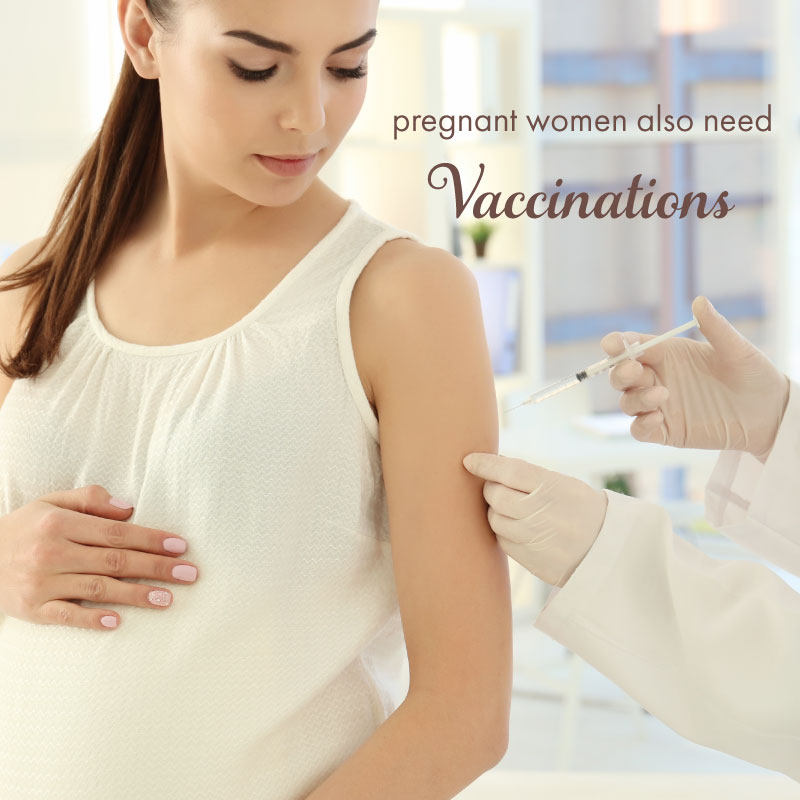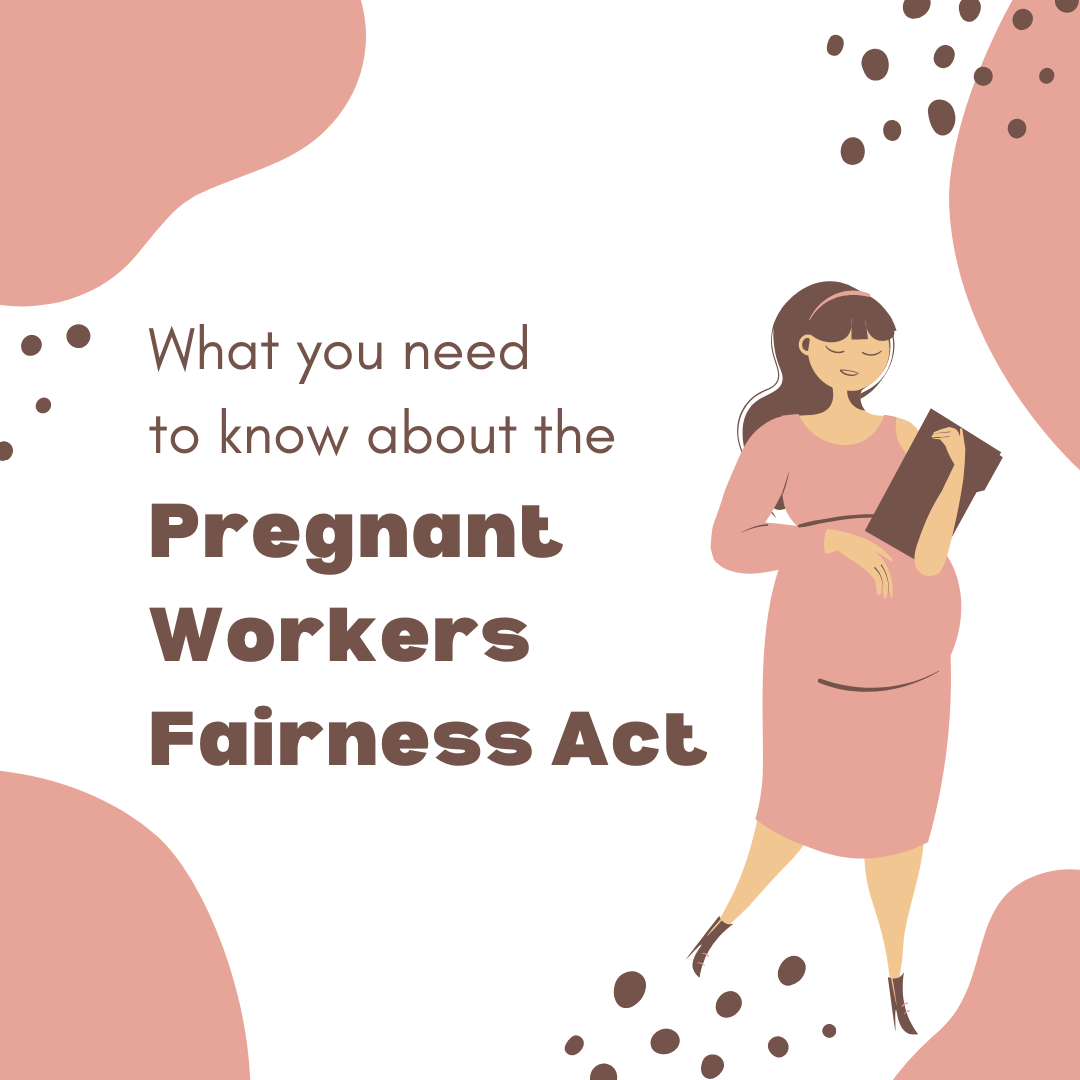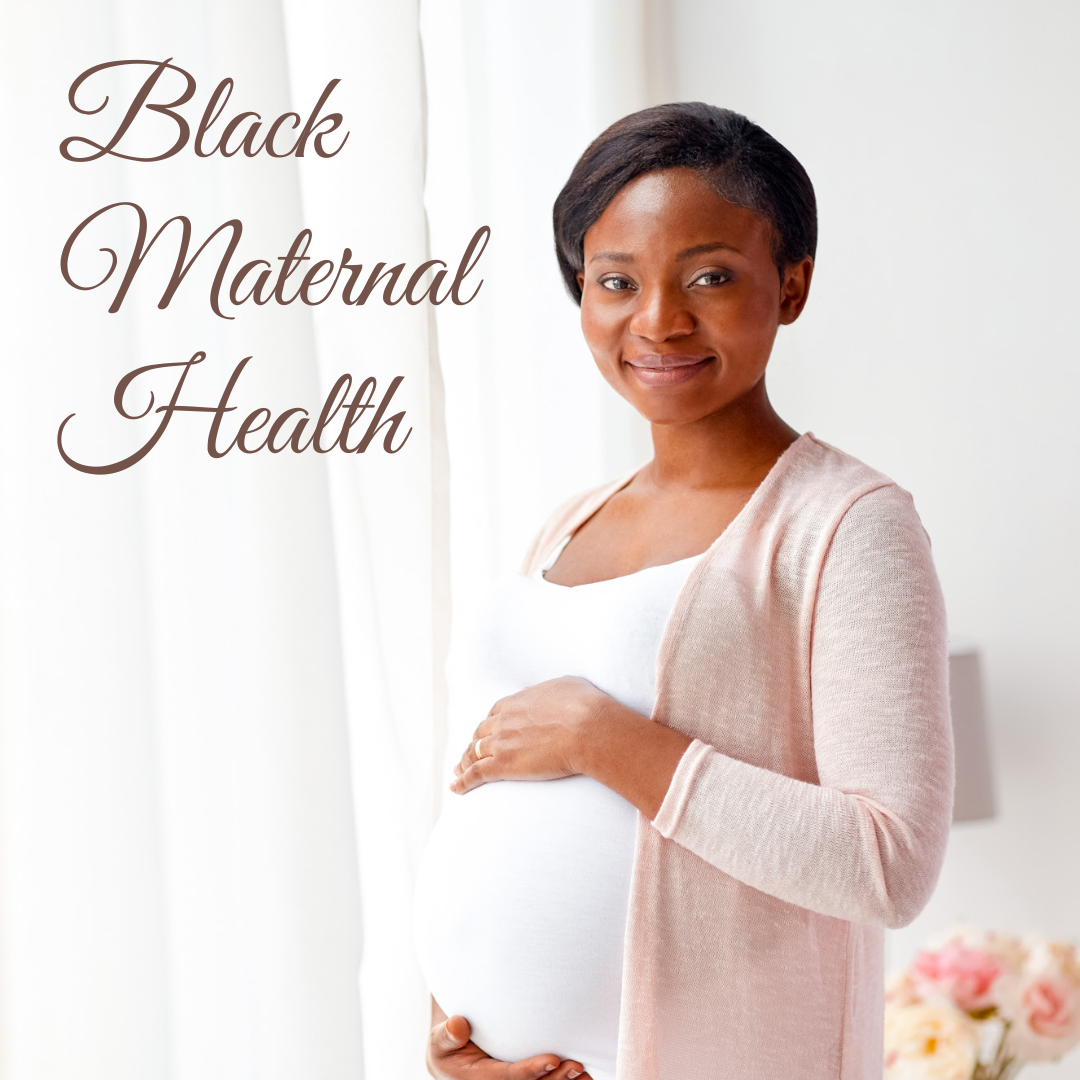“If I get vaccinated while pregnant, will it hurt my baby?” We hear some form of this question often and we love hearing it because it means our expectant moms are conscientious about having healthy pregnancies. Yes, vaccination is safe during pregnancy. In fact, there are several vaccines that pregnant women especially need and they have lasting benefits for both mom and baby. We will explain some of the most important ones.
Two of the vaccines expecting mothers should receive are the flu shot and the Tdap vaccine.
They Protect Both Mom and Baby!
Vaccination is one of the most important things moms can do to protect themselves and their babies from life-threatening diseases.
Vaccines administered during pregnancy protect both the expectant mom and her baby, because her body creates protective antibodies (proteins that fight off disease). Some of those antibodies get passed along to the baby before birth. These will protect the baby from disease during the first few months of life, until babies are old enough to receive vaccinations themselves. Newborns cannot get many vaccines until they are 2-6 months old.
Maternal Vaccines are Safe.
Both the Tdap and flu vaccines are very safe for women and their unborn children. There is no study to date that reported harmful results in women or their infants from the flu or Tdap vaccines. However, pregnant women should only receive inactivated vaccines (as opposed to a live attenuated vaccines). Like any medicine, vaccines can have side effects (such as redness, tenderness or irritation at the shot site), but most people who get vaccinated experience no side effects.
Getting Whooping Cough is Dangerous for Babies.
Pertussis (whooping cough) is a highly contagious lung disease and can be life-threatening for newborns. Multiple outbreaks in recent years showed that infants younger that 3 months old are at a very high risk of severe infection. About half of babies younger than 1 year old who get whooping cough need treatment in the hospital.
The characteristic “whoop” sound occurs in between coughing fits while sufferers struggle for breath. Many infants lack the strength to whoop, although they may still experience coughing fits, or may stop breathing and turn blue from lack of oxygen. Children and infants may vomit and become exhausted from coughing. Complications in infants can include pneumonia, seizures, brain disorders, hospitalization, and in rare cases, death.
When to get the Tdap Vaccine
The CDC, ACOG and the Society for Maternal Fetal Medicine recommend that expectant moms get the Tdap vaccine in their third trimester, between the 27th and 36th week. This way, they pass the greatest number of protective antibodies to baby before birth. The Tdap vaccine protects against tetanus, diphtheria and whooping cough.
Catching the Flu During Pregnancy Can Lead to Serious Complications.
Women who had healthy immune systems before pregnancy, or who had mild cases of the flu, may not yet see it as a major risk. Pregnancy can cause changes to the immune system, heart, and lung functions, which can make expectant moms more likely to get seriously ill from the flu.
Catching the flu during pregnancy means a higher risk of complications such as preterm birth and serious problems for the baby. Children younger than 2 years old are more likely to end up in the hospital from flu. Babies younger than 6 months are too young to get the flu shot, so receiving mom’s antibodies during pregnancy are their best defense against influenza.
When to get the Flu Vaccine
The flu vaccine can be given during any trimester. Flu seasons vary in their timing from season to season, but flu season is usually October to May. The CDC recommends getting vaccinated by the end of October. This timing helps ensure that you are protected before flu activity begins to increase. Moms who deliver their babies before getting the flu shot should still get vaccinated, because babies remain vulnerable during those first 6 months. Moms who breastfeed may also pass on antibodies through breastmilk.
Anyone Who is Around a Baby Needs Vaccines, too.
Newborns do not yet have fully developed immune systems. Until they are 6 months old, they are in a high-risk window when they are very vulnerable to diseases. Older kids and adults can infect babies with flu and whooping cough, even if they don’t feel very sick themselves. Because of this, anyone who is around babies should be up to date on all routine vaccines, including Tdap and flu vaccine. This includes parents, siblings, grandparents and other caregivers. Anyone who needs vaccines should get them at least two weeks before meeting the baby.
Update Vaccines with Every Pregnancy.
Women should get the flu shot every flu season and the Tdap shot with every pregnancy. Antibodies decrease over time. Levels may not stay high enough to provide protection for multiple pregnancies.
What about the COVID-19 vaccine?
The providers of North Florida Women’s Care recommend that women who are nursing, pregnant or trying to become pregnant may get the COVID vaccine when it is available to them.
Rare exceptions to this recommendation include people with a history of anaphylaxis to other vaccines, those who had recently tested positive for COVID, women who have recently received a COVID antibody infusion treatment, and women who received another vaccine within the past 14 days of the proposed COVID-19 vaccination date.
The risk of delaying the vaccine or not getting the vaccine, even while pregnant or breastfeeding, are much greater than the potential risks of the vaccines themselves.
- Pregnancy testing is not a requirement prior to vaccination.
- Pregnant women who experience side effects following vaccination may take acetaminophen.
- Side effects for pregnant people are not expected to be any different than in non-pregnant people.
- Pregnant patients should not receive Tdap or flu shots within 14 days after the COVID-19 vaccine.
- If a patient becomes pregnant after the first dose of the COVID-19 vaccine, providers can still administer the second dose, as indicated.
- mRNA vaccines are not thought to be a risk to the breastfeeding infant. People who are breastfeeding and are part of a group recommended to receive a COVID-19 vaccine, such as healthcare personnel, may choose to be vaccinated.
Pregnant people are at increased risk for severe illness from COVID-19:
Observational data demonstrate that pregnant people with COVID-19 have an increased risk of severe illness, including illness that results in ICU admission, mechanical ventilation, and death compared with non-pregnant women of reproductive age. Additionally, pregnant people with COVID-19 might be at increased risk of adverse pregnancy outcomes, such as preterm birth, compared with pregnant women without COVID-19.
*No safety data is available regarding COVID-19 vaccine use during pregnancy, during breastfeeding, or the effects of mRNA on breastfed infants or on milk production/excretion.
Sources: American College of Obstetricians & Gynecologists (ACOG), the CDC, the Society for Maternal Fetal Medicine, GSK, Vaccination Considerations for People who are Pregnant or Breastfeeding | CDC







